|
|
|
Sort Order |
|
|
|
Items / Page
|
|
|
|
|
|
|
| Srl | Item |
| 1 |
ID:
139442
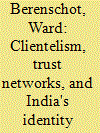

|
|
|
|
|
| Summary/Abstract |
With an election campaign for a seat in Gujarat's state parliament as its backdrop, this article relates India's persistent forms of identity politics to the evolution of trust networks. Political scientists and anthropologists have adopted highly divergent approaches to account for the ways in which India's politicians use social identities to mobilize support. A point of convergence, this article argues, lies in the social networks through which people solve everyday problems and organize access to state resources. Discussing the ever-changing salience of social divisions in Gujarat's politics – from class to caste to religion and region – this article argues that two characteristics of such trust networks – the extent to which these networks are organized along social divides and the extent to which they lend themselves to facilitating clientelistic exchanges with politicians – can foster or impede the political salience of these social divisions. The particular historical development of trust networks and their entanglement in patronage networks impacts the likelihood of the emergence of divisive political discourse.
|
|
|
|
|
|
|
|
|
|
|
|
|
|
|
|
| 2 |
ID:
139444
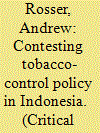

|
|
|
|
|
| Summary/Abstract |
Over the past decade and a half, the Indonesian government has progressed fitfully and inconsistently toward a stricter tobacco-control policy regime, albeit without much impact on the country's worsening tobacco epidemic. This article explains this pattern of reform in terms of the unequal but changing relationship of power between tobacco companies and tobacco farmers, on the one hand, and tobacco-control advocates based in NGOs, health professional organizations, universities, and international organizations, on the other. The first of these coalitions has had greater structural leverage, better political connections, stronger organizational capacity, greater ability to mobilize popular forces, and more capacity to cultivate a positive public image. But the second coalition has been able to exercise some influence over policy because of changes wrought by democratization. In this analysis, the author engages with the literatures on (1) Indonesia's political economy in the post–New Order period and (2) the politics of tobacco control in developing countries. With regard to the former, the author argues that we need to give greater attention to the role of actors previously excluded from the policy-making process than is currently the case. With regard to the latter, the author contends that more focus is needed on domestic actors and political institutions in shaping tobacco-control policy. Looking to the future, the author suggests that further progress in Indonesia's tobacco-control policies will be contingent upon an ongoing process of struggle; however, there are signs that the tide is turning in favor of the second coalition.
|
|
|
|
|
|
|
|
|
|
|
|
|
|
|
|
| 3 |
ID:
139441
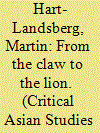

|
|
|
|
|
| Summary/Abstract |
This article argues that capitalist globalization is largely responsible for creating or intensifying many of our most serious economic and social problems. It first describes the forces that drove core country transnational corporations to create a complex system of cross-border production networks. It then maps the resulting new international division of labor, in which Asian countries, especially China, import primary commodities from Latin American and sub-Saharan African countries to produce exports for core countries, especially the United States. In core countries, globalization has led to the destruction of higher paying jobs, financialization of economic activity, and stagnation. While the new international division of labor has boosted third world rates of growth, especially in Asia, it has also left the third world with unbalanced and inequitable economies. Moreover, contradictions in the globalization process point to the spread of core country stagnation to the third world. Capitalist globalization has increased third world dependence on core country consumption while simultaneously undermining core country purchasing power. The article ends by discussing a process and program of transformation that highlights the feasibility of an alternative to global capitalism as well as the organizational capacities and institutional arrangements that must be developed if we are to realize it.
|
|
|
|
|
|
|
|
|
|
|
|
|
|
|
|
| 4 |
ID:
139443
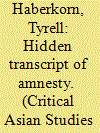

|
|
|
|
|
| Summary/Abstract |
There were two, not one, amnesty laws passed in relation to the 6 October 1976 massacre at Thammasat University and coup in Thailand. The first amnesty law, passed on 24 December 1976, legalized the coup and prevented those who created the conditions for the coup and seized power on the evening of 6 October from being held to account. The second amnesty law, passed on 16 September 1978, freed eighteen student activists still undergoing criminal prosecution and dismissed the charges against them. Although neither amnesty mentioned the massacre, the urgency of producing and then safeguarding impunity for the state and para-state actors behind the violence at Thammasat was the absent presence in both laws. Combining a close reading of both laws with examination of archival documents about the drafting of the first amnesty law and court and other records related to the second, this article uncovers the hidden transcripts of both amnesty laws as a point of departure for examining questions about impunity, law, and history. First, what are the legal mechanics through which violent actors escape accountability? Second, what are the legal and political functions of amnesty when no crime has been committed? Third and finally, might accountability for past violence be possible, and if so, under what conditions? The answers to these questions illuminate how impunity was produced in the specific case of the 6 October 1976 massacre in Thailand as well as address broader concerns about impunity's role in state formation.
|
|
|
|
|
|
|
|
|
|
|
|
|
|
|
|
| 5 |
ID:
139445


|
|
|
|
|
| Summary/Abstract |
Despite the increasing acknowledgment of scholars and practitioners that many large-scale agricultural land acquisitions in developing countries fail or never materialize, empirical evidence about how and why they fail to date is still scarce. Too often, land deals are portrayed as straightforward investments and their success is taken for granted. Looking at the coffee sector in Laos, the authors of this article explore dimensions of the land grab debate that have not yet been sufficiently examined. Coffee concessionaires in southern Laos often fail to use all of the land granted them and fail to produce high yields on the land they do use. Thus, the authors challenge the often-assumed superiority and effectiveness of large-scale versus small-scale production, specifically the argument that they modernize agricultural production and optimize land use. They argue that examining failed investments is as important as studying successful ones for understanding the implications of the land grabbing phenomenon for social, economic, and environmental outcomes. Knowledge about the scale of “failed land deals” provides important motivation for national governments to close the gap between intentions and actual outcomes. This article engages with the current debate on quality of investment and challenges the approach of employing land concessions as a vehicle for economic development in the Lao coffee sector and in other sectors and countries.
|
|
|
|
|
|
|
|
|
|
|
|
|
|
|
|
| 6 |
ID:
139446
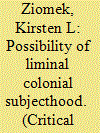

|
|
|
|
|
| Summary/Abstract |
This article examines whether writing histories of colonial subjects is possible. Traditional colonial histories subsume the colonial subject's individual history under a larger narrative of subjugation, which often does not allow room for people to exist outside the dichotomized role of collaborator/resister. This approach has left a gap in the scholarship for histories of colonial subjects whose lives do not easily fit either category. This article addresses this gap by detailing the life of Yayutz Bleyh, an Atayal woman who became one of the most important participants in the Japanese colonial administration of Aboriginal Affairs in Taiwan. For over six years, the author gathered fragmented pieces of information regarding Yayutz from a multitude of sources – visuals, as well as oral and written materials from inside and outside the colonial archive – in order to sketch the contours of an extraordinary woman and her life. Through the process of filtering these disparate sources, it was the silences regarding certain issues and the discrepancies that emerged among sources that proved to be the most revealing about Yayutz as someone who straddled both the world of the colonizer and the colonized.
|
|
|
|
|
|
|
|
|
|
|
|
|
|
|
|
|
|
|
|
|